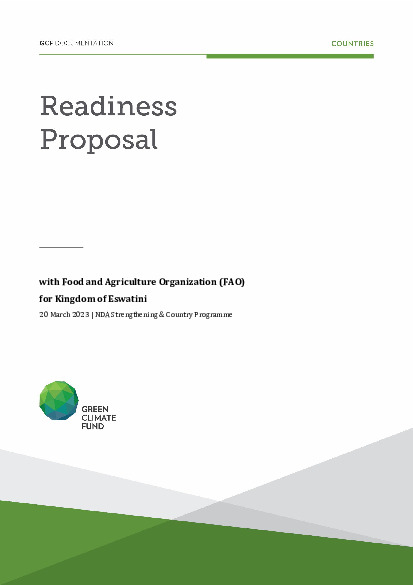Preparing for public and private investment in sustainable green infrastructure, green open spaces and urban agriculture for adaptation and mitigation to climate change in urban and peri-urban communities in Eswatini

Preparing for public and private investment in sustainable green infrastructure, green open spaces and urban agriculture for adaptation and mitigation to climate change in urban and peri-urban communities in Eswatini
Climate change and variability are evident in Eswatini in many forms, including hydrological disasters (droughts and storms), changes in rainfall regimes, including heavy rainfall events and extreme weather conditions. Eswatini is at high risk of natural hazards, which are expected to primarily affect the agricultural sector, through seasonal flooding and periods of drought. The country experiences natural hazards, such as violent storms and persistence drought, which is further exacerbating the country’s existing challenges of food insecurity, ability to attain development goals.
Eswatini still faces a number of Readiness gaps and barriers which limit the potential for climate change adaptation and mitigation particularly in urban and peri urban communities inhibiting the switch to green cities and making cities and human settlements inclusive, safe, resilient and sustainable. These gaps include:
- Limited availability and applications of baselines and indicators;
- The limited role/capacity of Eswatini Local Government Association (ELGA);
- Limited knowledge on actions/interventions for/on urban agriculture and food systems, infrastructure and technologies;
- Weak capacity, absence of knowledge and guidelines on advisory and extension services;
- Absence of an updated policy environment and incentive framework; and,
- Lack of awareness on how to make urban and peri urban spaces more resilient and adapted to climate change.
The main objective of the readiness proposal is to prepare for public and private investment in sustainable green infrastructure, green open spaces and urban agriculture for adaptation and mitigation to climate change in urban and peri-urban communities in Eswatini. This readiness proposal will achieve this by identifying, prioritizing and connecting cities’ climate change and variability driven environmental challenges (such as hydrological disasters (droughts and storms), changes in rainfall regimes, including heavy rainfall events and extreme weather conditions) with sustainable infrastructure investments and policy measures, awareness and capacity building. Urban and Peri-Urban communities in Eswatini are at high risk of natural hazards which include seasonal flooding, mudslides, destruction of infrastructure, property and livelihoods. It is of therefore of significant importance to ready the country for helping urban and peri- urban areas adapt to climate change by strengthening preparedness to hydrological disasters (droughts and storms), changes in rainfall regimes, including heavy rainfall events and extreme weather conditions which lead to these hazards. This is expected to lead to a better and more sustainable future for cities and their residents.